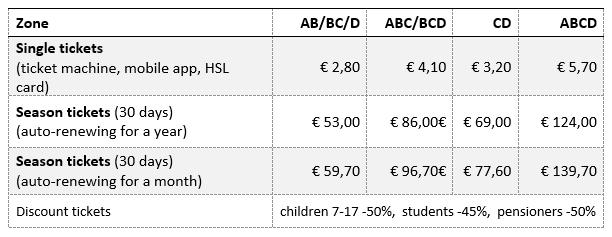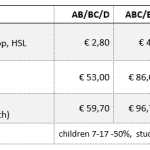Helsinki : Financing/Pricing data
Budget
2019: HSL’s operating income is 748,2 million euros, of which ticket revenue accounts for 51,2 percent and municipal contributions for 46,5 percent. The operating expenses are 735,3 million euros, of which public transport operating costs account for 70 percent.
Fares & Tickets
In the integrated Helsinki metropolitan area ticketing area, there are city internal tickets (one-zone tickets) and regional as well as extended regional tickets (for two and three zones).
Tickets are valid on all modes of public transport.
The electronic ticketing system in the region uses a contactless smart card, Travel Card.
About 90% of trips are made with Travel Card using either a pass for 14-366 days or a value ticket bought with money stored on the card. Single tickets and day tickets can be bought from drivers and conductors, vending machines and service points.

Funding of Public Transport
Public transport operating costs are funded by ticket revenue and municipal contributions. In 2019, the State subsidies to HSL were 4.8 million euros, 0.6 percent of HSL’s operating income.
Railway and national road network infrastructure is funded by the State, the cities participate.
Urban rail and bus infrastructure as well as stations and terminals are funded by the cities; the State participates occasionally, in particular in rail projects.
Rolling stock is financed by transport operators. The new Flirt commuter trains are funded by the Helsinki metropolitan area municipalities and VR (Finnish State Railways). The municipalities and VR are joint owners of Pääkaupunkiseudun Junakalusto Oy, a rolling stock company that purchases trains and leases them to the operator.
Current developments and projects
- Renewal of the Travel Card and information systems
- Renewal of the fare system
- Ring Rail Line to Helsinki Airport (17 km of new line, 7 stations), services started running in 2015
- West Metro from Ruoholahti to Matinkylä (14 km of new line, 8 stations), services will start running in 2017
- Feeder bus networks for the new rail lines (West Metro, Ring Rail Line)
- The planning of a light-rail line between Helsinki and Espoo has started
- Development of crosstown transport
- Development of Park and Ride schemes
- More efficient mobility management
- Making public transport more environmentally-friendly and energy-efficient
- Development of partnerships between different actors
